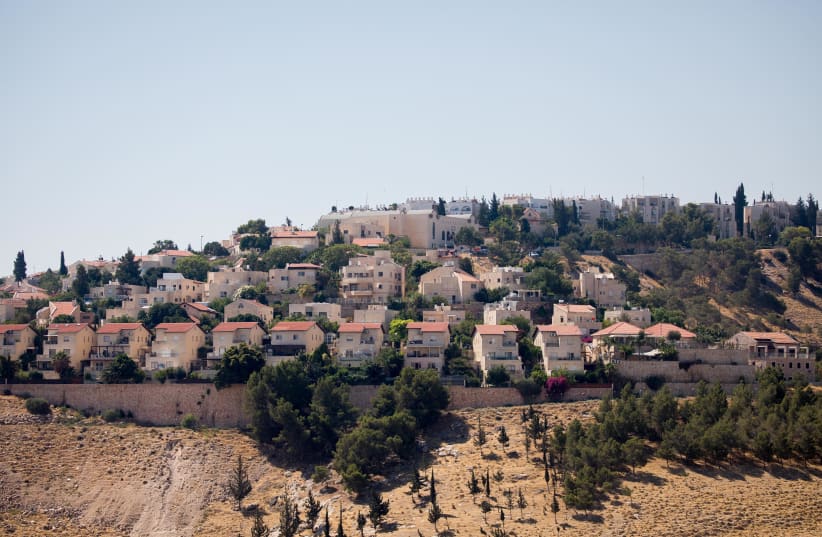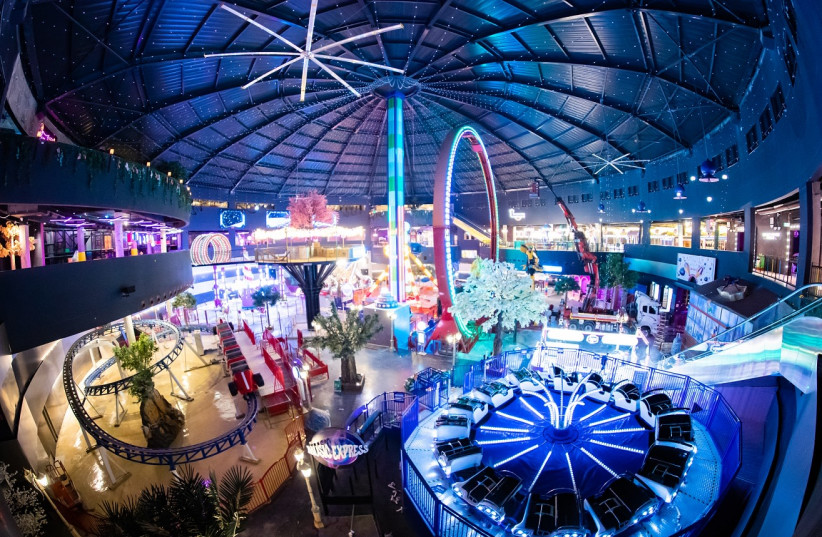Two recent headlines about the new Magic Kass amusement park and adjacent DCITY shopping mall make for an instructive contrast.
The Jerusalem Post’s Zev Stub reviewed the new developments east of Ma’aleh Adumim. The headline: “Israel’s newest amusement park brings ‘magic’ to Jerusalem outskirts.”
The headline in Haaretz took a different tack: “Israel’s shiny new theme park and mall that aren’t technically in Israel.”
While Stub’s article is a personal review of the amusement park, the Haaretz piece by Jonathan Shamir leans heavily political.
“It’s part of the efforts to normalize Ma’aleh Adumim to the Israeli public,” Shamir quotes Hagit Ofran, executive director of Peace Now’s Settlement Watch program. The area is “a huge problem for the development of a Palestinian economy, let alone a state.”
But one of the pictures included with the article subverts Shamir’s agenda: It’s an image of an Arab family taking a selfie and enjoying the park alongside their Jewish neighbors. If that’s normalization, I want more.
The contrast between Shamir’s critique and the photo chosen to go with it illustrates exactly why this part of the Middle East is stuck in a status quo that no one really wants but, at the same time, no one can figure out how to get past: Israel, to much of the world, is a symbol rather than an actual place.
This Israel-as-a-symbol is not filled with real people who strive to make a living and who mostly eschew politics. Instead, the country has become a talking point used by both sides to virtue signal to like-minded individuals.
Now, I’m hardly pro-settlements in my personal political views. I would have preferred that most had never been built.
But let’s step back for a critical reality check: The settlements aren’t going anywhere. Certainly not the big ones like Ma’aleh Adumim, Ariel and the Gush Etzion bloc.
Not the smaller ones either.
After 2005’s disengagement and the subsequent Hamas coup in the Gaza Strip, few in Israel have any interest in taking risks that could launch another terror wave. There’s scant political will for making a deal on the Palestinian Authority’s side, either.
If, however, we take as a starting point that the settlements – whether you believe they were established in sin or are the flourishing of Zionism 2.0 – are here to stay, then you are compelled to think out-of-the-box for a solution that will allow us to live in the same space. Maybe not together but neither on the constant verge of violence.
Symbols, by contrast, don’t allow for innovative ideas; they push people to dig their heels in further.
One of the most interesting approaches I’ve seen comes from the Hartman Institute’s Micah Goodman. In an article he wrote for The Atlantic, based on his book Catch-67, he reviews a proposal developed nearly 20 years ago called “Keep it Flowing.” It’s based on the idea that traditional borders ensuring contiguous territory simply won’t work here.
Instead, the plan calls for a network of bridges and tunnels to connect Palestinian cities and villages, eliminating checkpoints and allowing free movement below, above and alongside entirely separate Israeli highways.
“It would not be cheap to implement, because it involves tunnels and bridges, but it would create transportational contiguity for Palestinians,” Goodman writes. “If Israel were to pave this network of roads – and more important, give the Palestinian Authority autonomous control over it – the reality on the ground would be completely transformed. Israel would be able to abolish the main source of friction between the [Palestinian] civilian population and the [Israeli] military authorities.”
(A related plan to build a 37-kilometer bridge from Gaza to the West Bank was mooted in 1999 by French-Jewish architect Marc Mimram.)
To be sure, Goodman is not proposing a Palestinian state – at least not yet. This is not “part of a perfect, redemptive project” – for either side, he notes. Rather, “the occupation of the Palestinians can be shrunk without also shrinking Israelis’ security.”
Is this what activists on either side want? Not really. But compromise comes in many colors. For Goodman, this kind of “creeping segregation,” as he calls it, could be a good thing.
Compromise has proved to be beyond the scope of the Israel-haters.
Recall that, in 2015, SodaStream gave in to a high-pressure campaign by the BDS movement and relocated its bottling plant, the one that had been located not far from where the Magic Kass amusement park is today, to the Beersheba area. The move resulted in the loss of about 500 jobs for local Palestinians and the end of a workplace that was proud of its contribution to coexistence.
I’m not saying that a proposal like Goodman’s is inherently better or worse than two states with clearly defined borders. Nor am I advocating separation over integration as the ideal long-term solution. But it’s at least realistic. The alternative, as we’ve seen, is simply more stagnation.
Israel is here to stay. So are the Palestinians. And so are the settlements, whether they should have been authorized in the first place or not. Did their creation result in injustice? Absolutely. But libeling Israel as an apartheid nation run by genocidal settler-colonialists won’t solve a thing.
It’s time to move forward, to see Israel and the Palestinians for what they are, and to seek solutions that build up rather than obliterate coexistence.
If you’re still in need of a symbol, though, look no further than the Magic Kass roller coaster. It may have its ups and downs, but once on the ride, we’re all in it together – and there’s no getting off (just like those new highways to be built). But, hey, the view of the Dead Sea is spectacular.
The writer’s book, Totaled: The Billion-Dollar Crash of the Startup that Took on Big Auto, Big Oil and the World, is available on Amazon and other online booksellers. brianblum.com

